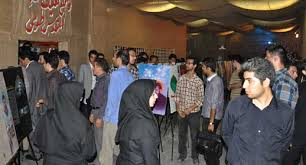Investigation null curriculum on Islamic Education Courses in Tabriz University
Keywords:
null curriculum, general courses, University of TabrizAbstract
The purpose of this study was to investigate teachers' experiences of the null curriculum in general education courses, University of Tabriz. Phenomenological research is method in this study. The population in this study are professor courses. That they were selected the 18 patients with purposive as sample. The instrument used in the research is interview .To achieve the required data with the 18 professors courses depth interviews were conducted .Smith proposed method was used for data analysis. Thus, the interviews were recorded on audio file immediately after the researcher listened and typed line by line and sub-themes were extracted by studying and comparing the post. The results showed that the content of courses in six core goals, content, classroom space, time, evaluation and teacher activities and teaching strategies are null factors. Keywords: null curriculum, general courses, University of Tabriz
References
Barnett, R., 1997. Beyond Competence", in Repositioning Higher Education, Coffield, Frank & Williamson, Bill (Ed.), Bristol, Open University Press. Bergenhenegouwen,G., 2009. Hidden Curriculum in the university .http;/www.Sociologyindex.com. daid j.flinders, nel noddings, and stephenj. thornton 1995., Stanford University "The Null Curriculum: Its Theoret. Basis and Pract. Implicat. Doberty, P., 1995. his colleages. "Planning for capabilities and progression for design and technology in the national curriculum?", in Teaching Technology, Banks, Frank (Ed.), Routledge. The Open University. Doberty, P., his colleages . “Planning for capabilities and progression for design and technology in the national curriculum?”, in Teaching Technology, Banks, Frank (Ed.), Routledge. The Open University. Eggleston, J., 1995. What is design and Technology education?", in Teaching Technology, Banks, Frank (Ed) Routledge. The Open University. Eggleston, J., What is design and Technology education?”, in Teaching Technology, Banks, Frank (Ed.), Routledge. The Open University. Eisner, E.W., 1994. The Educational Imagination: on design and evaluation of school programs (3.ed), New York, Macmillan. Eisner, E.W., The Educational Imagination: on design and evaluation of school programs”. New York, Macmillan. Fathivajargah, k., 2006. An autopsy experiential curriculum: A model for research in the field of curriculum. Scope of the curriculum,Tehran:Samt. Gair, M. 2003. Socrates never took attendance: hidden curricula in a teacher preparation program. (Arizona State University Tempe, AZ: Unpublished PHD thesis). Hajbagheri.m., 2007. Qualitative research methods,Tehran:Boshra. Hatch, M., 1997. Organization Theory", New York, Oxford Press. IEM Washington., 2007. Rules and Procedures", available at http://www.washingtonaccord.org. Klein, M.F., 1991. The politics of Curriculum Decision-Making", Albany, New York, Sunny Press. KUO-An, H., chia-Hao, Y., 2008. A synchronous distance discussion proceudure with reinforcement mechanism:designed for elementary school students to achieve the attending and responding stages of the affective domain teaching goals within a class period. Comput. Educat., V51np1538- 1552. Mhrmohamady, M., 2004. Curriculum: views, approaches and perspectives, Mashhad: publishing. Miller, J., 1383. Curriculum theory', translated Mhrmohamady, the publisher, Tehran. Mosapoor, N, 2008. Identification of neglected public education curriculum. Res. Projec.Min. Educat., in press. Mosapoor, N., Mhrmohammadi, M., 2008. Negligence of the curriculum: recognizing context and neglected aspects of the curriculum." Monthly Meeting of the Association for Curriculum Studies, June. porter.s., 1996. Qualitative research. In Cormack DFS(Ed) The Research process in nursing.3rd ed. Edinburg. Blackwell sci. Razavian, M., Saltangoraee, K.H., 2010. Study of teachers' perceptions of critical thinking. Ahzab Sci. train., 29-46. Sajjadieh, N., Bagheri, K.h., 2008. The philosophy curriculum of the Islamic Republic of Iran. plan Min. Educat., Tehran. Sari, M., Dogany, A., 2009. Hidden curriculum on gaining the value of respect for human dignity: A qualitative study in two eElementary schools in adana. educatonal sciences: Theory & Practice., 925- 940.
Sari, M., Dogany, A., 2009. Null curriculum on gaining the value of respect for human dignity: A qualitative study in two eElementary schools in adana. educatonal sciences: Theory & Practice., 925-940. Shaw, H., 2006. The hidden curriculum of seminary education. Bapt. Theolog. Sem., 8 23-52. Shaw, H., 2006. The Null curriculum of seminary education. Bapt. Theolog. Sem., 8 23 Shugrunsky, D., 2004. Type of curriculum in citizenship education, WWW.epea.asu.edu/epaa/u7n29. html. Shugrunsky, D., 2004. Type of curriculum in citizenship education, WWW.epea.asu.edu/epaa/u7n29. html. Sterling, D.R., 2009. Classroom management: setting up the classroom for learning. Sci. scope., V32n9 p29-33. Sterling, D.R., 2009. Classroom management: setting up the classroom for learning. Sci. scope., V32n9 p29-33. Tashakkori, A., Teddlie, C., 2003. Handbook of mixed methods in social & behavioral research. Thousand Oaks, Calif. ; London. SAGE Publicat. Van Manen, M., 1997. Researching lived experience. Human science for an action sensitive pedagogy (2nd Ed).Ontario, Althouse press. -Waite Hall, P., 2008. Student interaction experiences in distance learning courses a .phenomenological study. onl. J. dis. learn. Waite Hall,,P., 2008. Student interaction experiences in distance learning courses a phenomenological study. onl. J. dis.learn. Wilson, L.O., 2005. What are the types of curriculum, WWW.uwsp.edu/education/Lwilson/currhc/curtyp. Htm. Wilson, L.O., 2005. What are the types of curriculum, WWW.uwsp.edu/education/Lwilson/currhc/ curtyp.htm. Yuksel, S., 2006. The Role of Hidden Curricula on the Resistance Behavior of Undergraduate students in Psychological Counseling and Guidance at a Turkish University. Asia Pacif. Educat., Rev., 2006, Vol. 7, No. 1, 94-107. Yuksel, S., 2006. The Role of Null Curricula on the Resistance Behavior of Undergraduate students in Psychological Counseling and Guidance at a Turkish University. Asia Pacif. Educat. Rev., 2006, Vol. 7, No. 1, 94-107.

Published
How to Cite
Issue
Section
Copyright (c) 2020 Yousef Rezapour, Yousef Adib, Sajjad pourbaghban

This work is licensed under a Creative Commons Attribution-NonCommercial-NoDerivatives 4.0 International License.



